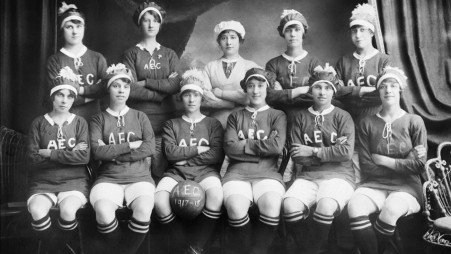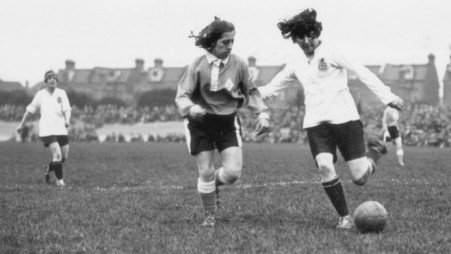Women who kept football alive during WWI
These working women were encouraged to take on different extracurricular activities to keep the spirits high during their spare time. Sports were encouraged and many factories started having their ensemble ladies' football teams.

Like all the other football leagues in Europe, English Football Leagues were also suspended during World War I. But, that certainly did not deprive the English fans of watching some great football. As the men were busy serving Britain in its war efforts, women football teams emerged and won the hearts of many British football fans.
From the beginning of WWI, Great Britain encouraged young men to join the army as volunteers. But within two years it understood that voluntary services will not be enough. So, in January 1916, Britain passed the Military Service Act which imposed drafting on all single men aged 18 – 41.
When almost all the men left for war, it was on the women to step up. For the first time in British history, millions of women took the jobs left vacant by men. These jobs included working in factories to make tanks, ammunition and aircraft. More than 900,000 women worked in munitions factories. These women were nicknamed "munitionettes."
These working women were encouraged to take on different extracurricular activities to keep the spirits high during their spare time. Sports were encouraged and many factories started having their ensemble ladies' football teams.
Suddenly, women football teams were popping up everywhere. Every city, town or county which had a munitions factory, had its football team.
Lincolnshire, prominent factory town of the British East Midlands had several women football teams. Local teams like Ruston Aircraft Girls, Lincoln Munition Girls, Foster Tank Girls gained popularity during the wartime. Lincolnshire continued to have women teams even after the war.
Similarly, the coastal town of Northumberland had a team called Blyth Spartan Munitionettes, formed in August 1917. All the women of the squad worked in Blyth's South Docks, loading ships with ammo. They were taught to play football by the British navy sailors on the beaches. They were the team to beat in those days. They went two years without a defeat.
One of the popular teams was the Dick, Kerr's Ladies FC, formed by the Dick, Kerr's & Company a locomotive and tramcar manufacturer based in Preston.

They started playing in 1917. They drew large crowds wherever they played. On Christmas day of their inception year Dick, Karr's Ladies FC beat Arundel Coulthard Factory 4–0 in front of a crowd of 10,000. After the war, the number of followers increased for the team. One game between the Dick, Kerr's Ladies and St. Helens in 1920 attracted 53,000 spectators, which still holds the record of the biggest crowd for a women's game in England.
Matches were played between teams from different factories and in north-east England, a cup competition was established. "Munitionettes Cup", held in 1918, attracted 30 teams. All of the matches' women played, raised money for War charities.
The biggest football star was Bella Raey
During the prime of women football in Britain, Bella Raey emerged as its brightest star. Playing for the Blyth Spartan Munitionettes, she was adored by the crowd and later went onto represent the national side.

Daughter of a local coal miner, Bella played as a centre forward. She scored a mind-numbing 133 goals in 30 games for the Blyth Spartans in two years. Her records include scoring six goals in a single match and scoring a hat-trick in the cup final against Bolckow-Vaughan of Middlesbrough at Ayresome Park in front of a crowd of 22,000.
After the 1918 season, Bella got a chance to represent England in July. On July 6, she was called up for an international side called North of England in a match against Tyneside Internationals. Two weeks later Bella played against Scottish Internationals.
In later years, Reay played for several local teams including Cowpen and Cambois.
FA banned women's football after the war
Women's football was never taken seriously by the local British press. Often they reported the matches with a great deal of humour and hilarity. Football was seen as a predominantly male sport and women were deemed physically unfit to continue playing and matching the roughness of a physically demanding game.
The Lincolnshire Chronicle, on 9th April 1921, reported after a 14-year-old footballer broke her leg in a match that, "lends strength to the contention in some quarters that football is a pastime unsuitable for the tender sex".
The same newspaper reported on a match between the Lincoln Ladies and Derby Munition Girls: "well, readers, to be candid, this game was very funny in many ways…most of us went to scoff (though not unkindly, I'm sure)."
Positive reports were rare, but another local newspaper The Lincolnshire Echo reported on the same match claiming that "there were some who distinctly showed an understanding of the finer points of the game."
After the War, in 1919 the Restoration of Pre-War Practices Act meant that many women were forced to leave their jobs in the factories and return to their pre-war roles. Many of the football teams formed during the time disbanded quickly. Some of the teams like Lincolnshire Ladies, however, continued to play exhibition or friendly matches until 1921.
But, the Football Association (FA) banned women's football at their affiliated grounds in 1921. On December 5th of that year, FA deemed "the game of football is quite unsuitable for females and ought not to be encouraged". They also encouraged their associates "to refuse the use of their grounds for such matches." Thus, a wondrous journey which started in 1916 was suddenly put on a halt.
FA wanted to earn much-needed revenues from the men's game which were commercial; on the other hand, women's matches were played for charitable causes. Some teams from Lincolnshire like the Lincoln Ladies and The Boston Ladies Club tried to defy the FA, but women could not play professionally until 1971 when the ban was finally lifted.



 Keep updated, follow The Business Standard's Google news channel
Keep updated, follow The Business Standard's Google news channel















